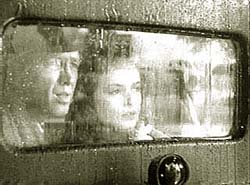I love helicopter shots.For the entire, entertaining poem, click the title of this post, and find Monday, November 20, 2006.
Slooping over early-morning Washington
in a drink-tilt...
Monday, November 20
Thanks, G-man
From Garrison Keillor's The Writers' Almanac and in turn from "Helicopter Shots (for Malene)" by Louise Vale.
Monday, November 13
Little Children: Throat-grabbing catharsis
After reading Tom Perotta's Little Children eighteen months ago, nothing about it made me think "movie." This is why the gods gave us Todd Field and his producers. In fact, there was a lot of interest in the book as a property before it swam onto the popular sonar. But, according to Field, things heated up after that. Perotta's Election made a terrific cult movie and he has written for the screen before.
My excuse for not spotting the potential in Little Children is, well, doctrine. The central pair of characters do not know what they want. This is the idiot's first lesson of what's wrong with your screenplay: character has no desire; goal is not concrete. I can hear the complaints already. I'll stipulate that in a brainy parsing of character motivation - alright, fine - you could argue that the set of obscure desires that Brad and Sara pursue are real, but submerged and purused subconsciously. Novels excel at this kind of story. Perotta's is one. But this is not a story made for Hollywood.
But in the third act, which is far from happy, characters are startled from their psychic sleep by emotional or physical violence. Each of them wades back into the mess of their lives, not better but no longer fleeing its limitations. Having heard interviews with Todd Field about the movie, he has given us what the book gives us: characters who are admirable and compromised. And that's what makes the end of the story so compelling. Brad, Sara, Larry, and Ronald are headed toward a bad end. But when they arrive, they do their level best, which turns out to be enough to keep them from ruining others' lives and their own.
Here is a fine pair of bookend moments. Early in the movie, Brad joins a late-night football league as the quarterback of the local policemen's team, the Guardians. They face off against CPAs for Brad's first game. The clobbering is a foregone conclusion. We only see the aftermath.
If we had seen the Guardians beaten (putting aside considerations of length for now), we would have been forced to see two things: Brad's relationship with the team, and the significance of the loss. Without these, we see a bruised Brad among teammates, but as isolated as before the game. Without the game, we were spared learning that together they were comic, pathetic, courageous, good-humored. They these would have compelled us to judge Brad, to take his part or build a case against him. Afterward, Brad is invigorated and stunned by the competition, regardless of the loss. Terrific choice.
In the bookend scene when the team finally wins, weeks after he's started an affair with Sara, she launches from the stands as his sole cheerleader. The fizzy fantasy of high school is recapitulated in a way that perfectly dramatizes his self-delusion and vanity. When he asks Sara to run away with him, even she says, "This isn't real."
Throughout, speaking as a guy, watching another guy in the midst of a believable, low-boil crisis, I found few qualities in Brad to admire. But I could not help but recognize the guy, and so identify with his temptations. The way he sidled into what he wanted and hoped for, namely Sara. The way he edged away from his wife and home responsibilities. The way he longed for the skateboarders' ability to defy gravity.
So when Brad makes the choice, even as he leaves his house, not to leave his wife, you feel a tremendous sense of relief. Life does not run downward from stupid mistakes to tragedy. It apparently leaves hope on its way to distress through false hope and then takes a steady uphill grade build of limitations and unalterable fact.
My excuse for not spotting the potential in Little Children is, well, doctrine. The central pair of characters do not know what they want. This is the idiot's first lesson of what's wrong with your screenplay: character has no desire; goal is not concrete. I can hear the complaints already. I'll stipulate that in a brainy parsing of character motivation - alright, fine - you could argue that the set of obscure desires that Brad and Sara pursue are real, but submerged and purused subconsciously. Novels excel at this kind of story. Perotta's is one. But this is not a story made for Hollywood.
But in the third act, which is far from happy, characters are startled from their psychic sleep by emotional or physical violence. Each of them wades back into the mess of their lives, not better but no longer fleeing its limitations. Having heard interviews with Todd Field about the movie, he has given us what the book gives us: characters who are admirable and compromised. And that's what makes the end of the story so compelling. Brad, Sara, Larry, and Ronald are headed toward a bad end. But when they arrive, they do their level best, which turns out to be enough to keep them from ruining others' lives and their own.
Here is a fine pair of bookend moments. Early in the movie, Brad joins a late-night football league as the quarterback of the local policemen's team, the Guardians. They face off against CPAs for Brad's first game. The clobbering is a foregone conclusion. We only see the aftermath.
If we had seen the Guardians beaten (putting aside considerations of length for now), we would have been forced to see two things: Brad's relationship with the team, and the significance of the loss. Without these, we see a bruised Brad among teammates, but as isolated as before the game. Without the game, we were spared learning that together they were comic, pathetic, courageous, good-humored. They these would have compelled us to judge Brad, to take his part or build a case against him. Afterward, Brad is invigorated and stunned by the competition, regardless of the loss. Terrific choice.
In the bookend scene when the team finally wins, weeks after he's started an affair with Sara, she launches from the stands as his sole cheerleader. The fizzy fantasy of high school is recapitulated in a way that perfectly dramatizes his self-delusion and vanity. When he asks Sara to run away with him, even she says, "This isn't real."
Throughout, speaking as a guy, watching another guy in the midst of a believable, low-boil crisis, I found few qualities in Brad to admire. But I could not help but recognize the guy, and so identify with his temptations. The way he sidled into what he wanted and hoped for, namely Sara. The way he edged away from his wife and home responsibilities. The way he longed for the skateboarders' ability to defy gravity.
So when Brad makes the choice, even as he leaves his house, not to leave his wife, you feel a tremendous sense of relief. Life does not run downward from stupid mistakes to tragedy. It apparently leaves hope on its way to distress through false hope and then takes a steady uphill grade build of limitations and unalterable fact.
Friday, November 3
I think I've got it! Or 30 Rock hasn't got it, that is.
In case you check regularly for cool opinions here, I know I'm disappointing you. And then, when I do post... well, let's not get all humble. The thing is I'm planning my wedding which, though ten months off, promises to be the most complex and expensive project I've ever done. I can't wait. And then there's work and writing. You know?
Funny? Who Needs Funny?
Every week 30 Rock sits there like ingredients for chocolate chip cookies - the simplest no-fail sweet treat. Alec Baldwin, for cripes sake! And what comes out is mud. I'm with Rob Long (Listen to the Zoom Up episode of Martini Shot) when he complains that today's comedy isn't funny much. I'm getting used to those bits that make you turn and say, "Wasn't that funny?" The question is rhetorical;you're not laughing. And that's TV comedy today.
But where's the subtext? Does Jack (Alec Baldwin) really like Liz Lemon (Tina Faye)? And what would distinguish one of the guys in the writers room from another? Uh huh. A not-quite hidden agenda, which we could see screwing with the others, getting in the way of Liz's success. As if she needs any obstacles that her own dithering doesn't create.
Okay, I know there are other problems with this show, but none of the characters seems to know anything. None of them is smart and selfish enough to be creating havoc. Tracy Jordan (Morgan) is clueless, which is a deep vein of situational gags. But he's never going to be conniving or conflicted. He'll never know himself well enough for that.
Why am I piling on? This is not my golden age of television!
Funny? Who Needs Funny?
Every week 30 Rock sits there like ingredients for chocolate chip cookies - the simplest no-fail sweet treat. Alec Baldwin, for cripes sake! And what comes out is mud. I'm with Rob Long (Listen to the Zoom Up episode of Martini Shot) when he complains that today's comedy isn't funny much. I'm getting used to those bits that make you turn and say, "Wasn't that funny?" The question is rhetorical;you're not laughing. And that's TV comedy today.
But where's the subtext? Does Jack (Alec Baldwin) really like Liz Lemon (Tina Faye)? And what would distinguish one of the guys in the writers room from another? Uh huh. A not-quite hidden agenda, which we could see screwing with the others, getting in the way of Liz's success. As if she needs any obstacles that her own dithering doesn't create.
Okay, I know there are other problems with this show, but none of the characters seems to know anything. None of them is smart and selfish enough to be creating havoc. Tracy Jordan (Morgan) is clueless, which is a deep vein of situational gags. But he's never going to be conniving or conflicted. He'll never know himself well enough for that.
Why am I piling on? This is not my golden age of television!
Subscribe to:
Comments (Atom)


